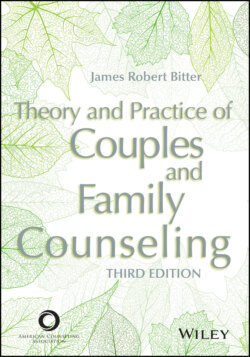Читать книгу Theory and Practice of Couples and Family Counseling - James Robert Bitter - Страница 94
Virtue Ethics
ОглавлениеWhereas principle ethics focuses on actions and choices based on predetermined values (Corey et al., 2019), virtue ethics focuses on the character traits of individuals or the profession (Kleist & White, 1997). Principle ethics asks, “What shall be done?” Virtue ethics asks, “What kind of person shall the family practitioner be?” What do you think? Is it possible that your ethical behavior as an emergent family counselor or therapist is more about personal moral being than a mere understanding and application of a set of ethical principles?
There are multiple positions on virtue ethics just as there are on principle ethics. Jordon and Meara (1990) defined virtue as “nurtured habits grown mature in the context of a formative community and a shared set of purposes and assumptions” (p. 110). Virtue in this sense is not innate: It is learned. Although principle ethics can be taught, it is not as easy to teach integrity, courage, and humility. And if these are important virtues to have, how does one measure them? Virtue ethics involves “making ethical judgments based on the development and implementation of professional virtues associated with [professional] practice” (Bitter, 2014, p. 524). Advocates of virtue ethics argue that family practitioners should not merely seek the safety of ethical behavior, as in principle ethics, but should aspire to an ethical ideal. At the beginning of this chapter, we considered some of the virtues that might serve as ethical ideals in couples and family practice. Not only must we be individually and collectively clear about those characteristics, we must also be mindful of the virtue ethics reflected in the families we serve (Gamino & Ritter, 2009). Cohen and Cohen (1999) and Vasquez (1996) have long argued for ethical decision-making based on principle ethics but grounded in a foundation of virtue ethics. For Vasquez, virtue ethics can facilitate multicultural practice in the same way that boundary setting enhances flexibility.
For example, you are seeing a Native American family in counseling at a local agency that offers free counseling for those families with limited means. You have successfully guided the family to a place at which they would like to terminate the counseling relationship. At your final session, the family presents you with a blan ket that they have made together. To them, the blanket represents a thank you for the services provided. Typically great caution is suggested in all professional codes when considering accepting a gift or bartering for therapeutic services. Vasquez (1996) would suggest that the virtue of respect may contribute to understanding that the blanket is offered as a cultural means of expressing appreciation. Emphasis on the character of the individual and the profession provided by virtue ethics adds a sense of personal responsibility to the more external guidelines of principle ethics.
That said, virtue ethics has plenty of detractors. Like principle ethics, virtue ethics can be challenged for their cultural relevance. Bersoff (1996) acknowledged the social construction and social embeddedness of virtues and community wisdom, the very foundation of a virtue ethics perspective. Think of the virtues that you hold dear. Where did they come from? Do you have any idea of the history of these virtues in your own cultures? The very nature of multiple cultures means that there will be diverse perspectives on what is defined as virtue and virtuous behavior.
The teachability of virtue ethics is an additional dilemma (Bersoff, 1996; Kitchener, 1996). Can the virtues of the helping professions be taught within a 2- or 3-year program? What about the nurtured habits that you developed within your family of origin? What if some values nurtured in you from the time you were an infant do not fit well with the virtues of the helping professions? Would you be willing to give up values you have held all your life and adopt the values supported by your profession? What would that mean for you within your own family life? If professionally congruent virtues cannot be taught and learned during a graduate program, those programs may have to adopt the difficult position of choosing candidates who already possess professionally desirable attributes and values (Bersoff, 1996). What are the problems that accompany this idea? The problems would be even more complex if members of a profession had to agree on a set of professional virtues and then create a means of assessing candidates during the interview process. Impossible, you say! Maybe, but some preparation programs are currently attempting to do exactly that.
